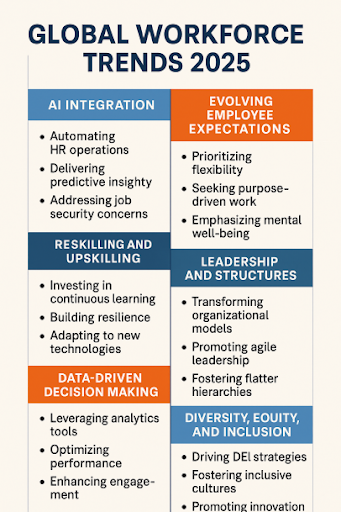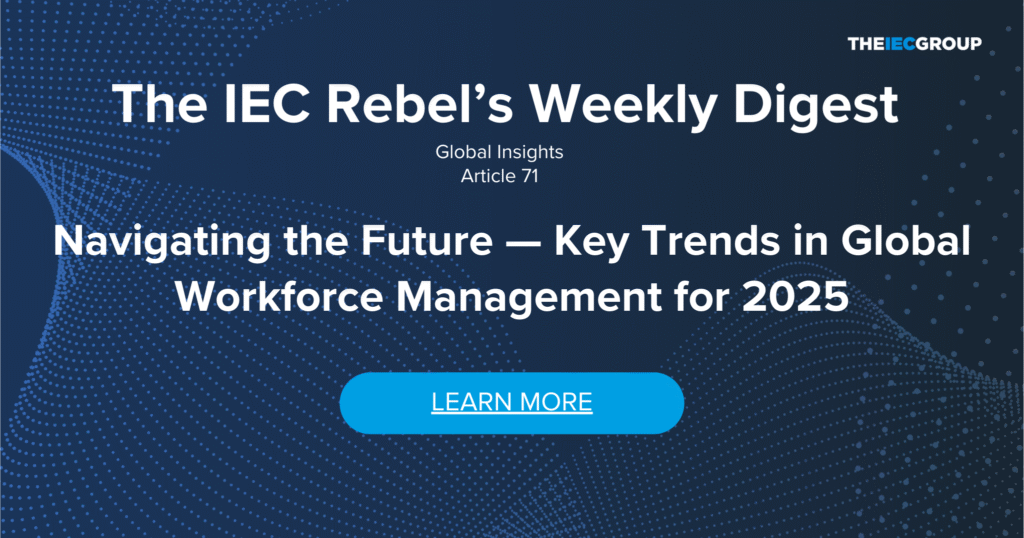Navigating the Future — Key Trends in Global Workforce Management for 2025
 As we progress through 2025, global workforce management is undergoing a profound transformation. The convergence of artificial intelligence (AI), shifting employee expectations, new work models, and evolving technologies is redefining how companies attract, manage, and retain talent. This article dives into the most pivotal trends shaping the global workforce, offering forward-thinking insights for HR leaders and executives steering organizations through uncertainty and opportunity.
As we progress through 2025, global workforce management is undergoing a profound transformation. The convergence of artificial intelligence (AI), shifting employee expectations, new work models, and evolving technologies is redefining how companies attract, manage, and retain talent. This article dives into the most pivotal trends shaping the global workforce, offering forward-thinking insights for HR leaders and executives steering organizations through uncertainty and opportunity.
- AI Integration: Revolutionizing Workforce Dynamics
AI has evolved from hype to backbone. It’s automating admin-heavy HR functions, enhancing decision-making, and creating personalized talent journeys.
- Automation at Scale: From chatbots in candidate screening to AI-generated training content, companies like IBM and Unilever are leveraging AI to scale smarter HR operations.
- Predictive Insights: AI is helping HR teams anticipate turnover, predict performance dips, and assess the long-term ROI of learning investments.
- Human Concerns: But there’s a trust gap. Workers, especially Gen Z, are expressing concern about being replaced. Transparency and upskilling will define how AI adoption is received across global teams.
- Evolving Employee Expectations: Purpose, Flexibility, and Well-being
Today’s talent wants more than a paycheck. They want meaning, autonomy, and sustainable workloads.
- Purpose-Driven Work: Gen Z is vocal about wanting jobs that align with their values — or they’ll walk. Ethics and impact matter as much as salary.
- Flexible by Default: Remote work has gone from perk to expectation. The hybrid “3-2” model (three days in, two remote) is common, but many now push for asynchronous-first setups.
- Mental Health as Infrastructure: From burnout prevention to therapy subsidies, companies are treating mental health as seriously as physical safety.
- Reskilling and Upskilling: Building Resilience in Real Time
The half-life of skills is shrinking fast. Static CVs are out; skills-based development is in.
- Internal Talent Marketplaces: Companies like Schneider Electric and Nestlé are building internal gig economies, letting employees self-select into short-term roles or projects to gain skills.
- Skills-Based Hiring: Degrees are losing ground to demonstrable skills, and platforms like LinkedIn and Degreed are feeding credential-based ecosystems.
- Microlearning at Scale: Short, skill-focused modules — delivered just-in-time — are winning over legacy LMS platforms.
- Redefining Leadership and Organizational Structures
The CEO of 2025 isn’t just strategic — they’re adaptive, empathetic, and agile.
- Flatter Hierarchies: Organizations are shedding middle layers and empowering cross-functional teams to self-manage.
- Culture over Command: Leadership styles are shifting from directive to facilitative. Coaching, listening, and team-level decision-making are essential.
- Inclusive Authority: Decision-making is becoming more distributed, especially in global companies where regional autonomy drives faster execution.
- Data-Driven Decision Making: From Gut Feeling to Workforce Intelligence
People analytics has moved from dashboards to DNA.
- Real-Time Metrics: Pulse surveys, productivity analytics, and attrition predictors are being integrated into daily HR dashboards.
- DEI Data Accountability: Companies are not just tracking representation but also inclusion metrics — who gets promoted, who gets stretch assignments, who feels heard.
- Performance without Surveillance: Ethical use of employee data is now a branding issue. Consent-based analytics and transparency about use are non-negotiables.
- Embracing Diversity, Equity, and Inclusion (DEI)
DEI is no longer a side initiative — it’s a business imperative.
- Beyond Representation: Companies are now measuring belonging, psychological safety, and promotion equity across underrepresented groups.
- Global DEI Strategy: As companies scale internationally, DEI must localize — what inclusion means in Berlin isn’t what it means in Bangalore.
- Inclusive Tech: Vendors are being vetted for bias in algorithms, from ATS filters to compensation tools.
- Navigating Economic Uncertainty and Workforce Restructuring
2025’s HR leaders must manage turbulence without losing trust.
- Workforce Fluidity: Organizations are moving to core + flex models, combining full-time teams with freelancers, consultants, and EORs (Employer of Record).
- Strategic Headcount Planning: Economic volatility is pushing companies to scenario-based workforce planning — with built-in agility for downsizing or upskilling.
- Transparent Transitions: How layoffs or restructurings are communicated and executed impacts brand equity — externally and internally.
- Technology, Tools, and Services Beyond AI: Building the HR Stack of the Future
While AI grabs headlines, a quieter revolution is reshaping HR tech stacks — one API at a time.
- Workforce Orchestration Platforms: Tools like Deel, Rippling, and Atlas are consolidating EOR, compliance, and payroll across borders, giving global companies one source of truth.
- Skills Ontologies & Taxonomies: Platforms like SkyHive and Workday Skills Cloud are mapping workforce capabilities dynamically, enabling faster internal mobility and hiring.
- Connected Ecosystems: The new HR stack is modular. Companies are favoring best-of-breed integrations over monolithic suites. Think: Greenhouse for recruiting, Lattice for performance, Gusto for payroll — stitched together with middleware like Zapier or Workato.
- Employee Experience Platforms (EXPs): Platforms like Microsoft Viva and Culture Amp are personalizing the digital employee journey — surfacing nudges, goals, feedback, and learning all in one place.
- Compliance-as-a-Service: Especially critical in cross-border setups, tools like Shield Geo and Globalization Partners handle localized labor law, taxes, and benefits, letting HR focus on strategy, not red tape.
This new generation of tools isn’t just about efficiency — it’s about creating a responsive, compliant, and employee-centric ecosystem that grows with the business.
- DEI in the Crosshairs: U.S. Policy Shifts and Corporate Strategy
In 2025, Diversity, Equity, and Inclusion (DEI) initiatives in the United States are facing significant challenges due to policy shifts under the Trump administration. Executive Orders 14151 and 14173 have rolled back federal DEI programs and rescinded mandates like Executive Order 11246, which previously required federal contractors to implement affirmative action plans.
These changes have led to a wave of corporate responses:
- Policy Reversals: Companies like Verizon have ended DEI programs to secure federal approvals for major deals.
- Quiet Reinstatements: Some organizations are discreetly bringing back DEI initiatives under different names, such as “inclusive culture,” to avoid political backlash while addressing internal and external expectations.
- Legal Challenges: Firms are navigating lawsuits and regulatory scrutiny related to DEI practices, prompting a reevaluation of their approaches.
Strategic Recommendations for U.S. Companies:
- Reassess DEI Frameworks: Evaluate existing DEI programs to ensure compliance with current federal directives while maintaining commitments to diversity and inclusion.
- Transparent Communication: Clearly articulate the company’s stance on DEI to stakeholders, balancing legal compliance with organizational values.
- Alternative Terminology: Consider adopting terms like “inclusive culture” or “belonging initiatives” to continue promoting diversity without triggering political sensitivities.
- Legal Consultation: Engage legal experts to navigate the evolving regulatory landscape and mitigate potential risks associated with DEI programs.
- Global Alignment: For multinational companies, align U.S. DEI strategies with global practices to maintain consistency and uphold international standards.
By proactively adapting to the changing DEI landscape, U.S. companies can continue to foster inclusive workplaces while navigating the complexities of the current political environment.
Conclusion: From Managing to Orchestrating
Workforce management in 2025 isn’t about control — it’s about orchestration. It’s about dynamically deploying talent, rethinking value creation, and curating employee experiences that meet people where they are. Companies that cling to rigid policies, siloed systems, and legacy mindsets will struggle to attract or retain top talent.
HR’s seat at the table is no longer in question — but the pressure is on. Leaders who embrace AI responsibly, invest in reskilling, adopt agile technologies, and put purpose before policy will shape not just the future of work — but the future of growth.
Go To’s: Audit your workforce tech stack, prioritize skill-based development, and reassess leadership agility. Align your talent strategy with employee expectations—flexibility, purpose, and well-being are non-negotiables. Use analytics to drive smarter decisions and create a culture of continuous learning. Ensure your DEI efforts are globally consistent and locally relevant. Don’t just adapt—lead the transformation.
IEC Rebel’s Digest— The IEC Group can help you audit your global employment setup by identifying labor leasing risks, verifying licensing requirements, and ensuring your EOR partners meet every compliance standard—before regulators come knocking.
Last but not Least: If you’re facing challenges and wondering how others are managing similar issues, why not join The Leadership Collective Community? It’s a peer group and webcast platform designed for leaders to exchange insights and experiences.
Introducing the IEC Knowledge Network Free Membership – Your Gateway to Seamless Access!
We are thrilled to present a new service that goes beyond the ordinary download experience. In addition to offering you the ability to download the things you love, we are delighted to introduce the IEC Knowledge Network Free Membership.
The Free Membership option grants you access to our library of articles and videos, without the need for tedious registrations for each piece of content.
The publication serves as a trusted resource to support executives in their pursuit of sustainable and successful global expansion. In addition the IEC Practitioners are available to discuss your specific challenge in more detail and to give you clear advise..
Take advantage of this valuable resource to accelerate your global expansion journey


